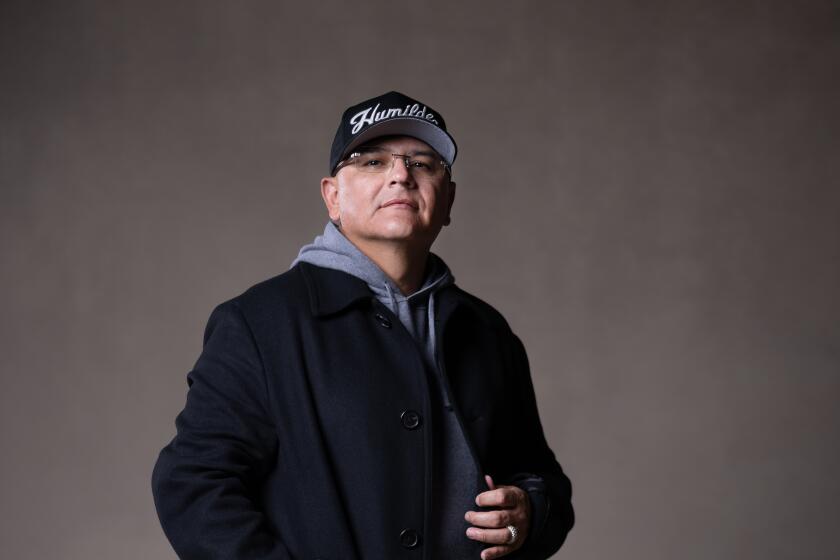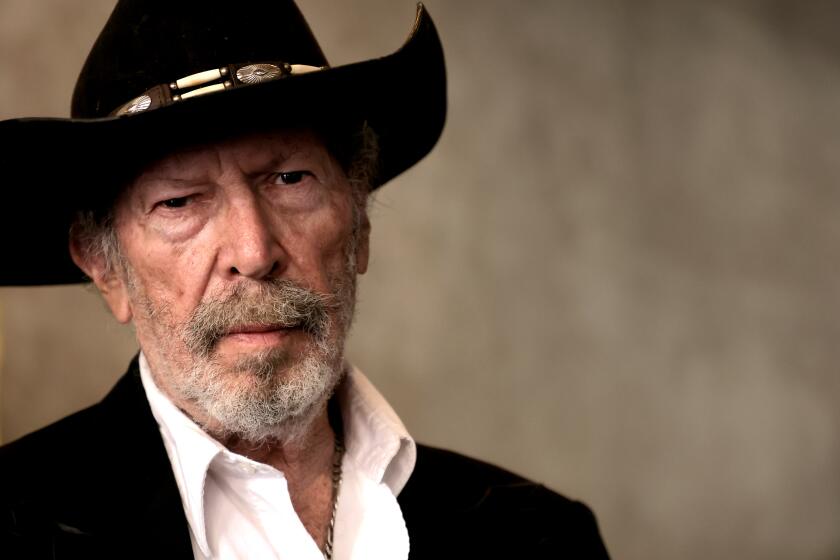Lee Hazlewood, talkin’ before it’s sundown
THIS isn’t what Lee Hazlewood calls one of his good days. Those usually come when he’s taken some pain medication, but he’s abstaining today so he can think clearly.
He estimates the pain at 3 or 4 on a scale of 10, especially on the side where they took the kidney out, but he’s had days where it’s off the scale -- at 14, even 20 -- since his renal cancer was diagnosed a year and a half ago.
The cane leaning against the leather couch in his living room helps him get up and down and steady him when he’s dizzy. He still smokes a little, he says, because he doesn’t have lung cancer, but he doesn’t eat much. No one has told him how much time he has left.
“It’s nature’s way of telling us to slow down, that corny old line,” the 77-year-old pop-music maverick says with a raspy chuckle, sitting in the curtain-shaded room. “The only thing that’s bothered me with this whole thing is the pain. I am the biggest sissy in the world about pain.... But we quiet it down from time to time....
“The whole thing of this with my children and my grandchildren and even my great- grandchildren, we’ve kept it a joke. They know cancer jokes.... And they say one of these days Grandpa’s not gonna be here for that reason.”
This is where one of the most enigmatic figures to emerge from the ferment of the 1960s -- an overlooked pioneer of many genres and a man who apparently walked away from potential stardom -- is living out his days in a two-story house in a pleasant suburban development with his third wife and two cats.
Here, he’s not too distant from his childhood homes in Texas and Oklahoma, nor from Phoenix, the city where he got his start in music in the 1950s as a disc jockey, songwriter and record producer.
And of course there’s Los Angeles, where he reached his career peak in the 1960s, working with Frank Sinatra, seeing Dean Martin make a hit record of his “Houston,” and writing and producing a series of hits for Frank’s daughter Nancy Sinatra, including one of the decade’s iconic recordings, “These Boots Are Made for Walkin’.”
More distant are the European cities -- Stockholm, London, Paris -- where he withdrew at the height of his success, embarking on what’s been generally described as an itinerant, bohemian, reclusive life.
Lighting a cigarette, Hazlewood scoffs at that image.
“There was a little bit of a thing about ‘old mystery Lee’ and stuff, ‘he moves around’ and all that garbage. I have a reason for everything I’ve ever done. It’s not just a haphazard sort of life.”
But being regarded as an idiosyncratic genius didn’t hurt as he issued a succession of offbeat, personal albums overseas in the 1970s. Several of them were among the Hazlewood reissues put out in the late ‘90s by Smells Like Records, an independent label owned by Sonic Youth’s drummer Steve Shelley, and the expatriate troubadour’s legend burgeoned in the alternative-music world.
Stars such as Nick Cave sang his praises, and a 2002 tribute album, “Total Lee: The Songs of Lee Hazlewood,” features some stellerindependent artists, including Tindersticks, Lambchop, Calexico, Johnny Dowd and Pulp’s Jarvis Cocker and Richard Hawley.
“He’s just really creative, and his personal story is very intriguing,” says Joey Burns of the Tucson-based Calexico. “I think the fact that he had left the States and lived in Sweden for a while, there’s a lot of my friends that have done just that, or have done the opposite, come here from France or somewhere in Europe and are living in the desert. So there’s a connection to that kind of sensibility.
“And all his classics, they kind of go somewhere. There’s some kind of journey happening with the story. It’s a very imaginative place.... You can tell there’s some drama.
“And I love his more obscure stuff too. I mean he’s very abstract and kind of out there at times, and a freak, and that’s what my friends and I all love about them. He’s out there.”
Hazlewood’s exit is being accompanied by a new album that he started writing a couple of years ago. When he found out he was ill, he declared it would be his final record and he titled it “Cake or Death” after a routine by one of his favorite comedians, Eddie Izzard.
The album, which comes out Tuesday on the Ever label, is marked by typically contrary Hazlewood moves. Instead of crafting a grand, concluding statement, he’s collected a motley set of quirky songs. Rather than recruiting big-name former partners such as Sinatra or Ann-Margret for duets, he paired with lower-profile European performers such as Ann Kristin Hedmark and Bela B.
He even turns over one track, “She’s Gonna Break Some Heart Tonight,” to a friend, singer Tommy Parsons, and he lets his 8-year-old granddaughter Phaedra Dawn Stewart sing on a short version of his cult classic “Some Velvet Morning.”
“I wanted to get a little politics in it and a little of my darkness in it and a little of the silliness in it, and I think I got all of it in,” says Hazlewood.
It also has typically potent music. His blast at the United States’ Iraq adventure, “Baghdad Knights,” is driven by a bluesy, bugle-call of a guitar hook Duane Eddy, whose 1950s hits such as “Cannonball” and “Rebel Rouser” were produced by Hazlewood, adds his trademark twangy guitar behind the singer on a jazzy version of “Boots.”
Hazlewood’s distinctive, deep voice -- a sort of cross between Neil Diamond and Johnny Cash -- sounds rich and strong throughout the record, a result of restricting the vocal dates to days when he was feeling good.
“I don’t think it has any sickness in it,” says Hazlewood, eyes twinkling behind his lightly tinted sunglasses. “Except perhaps the lyrics or something like that.”
An artist’s artistry
HAZLEWOOD’S fondness for a quip has helped his reputation as an irreverent character who doesn’t take anything too seriously, but when you sample a range of his music, it’s clear that he’s not just a prankster.
His first album, 1963’s “Trouble Is a Lonesome Town,” a series of character sketches linked by Hazlewood’s spoken narration, was ahead of its time, sounding like something Cash might have conjured, with a trace of Roger Miller.
He continued in that country-folk vein in his subsequent solo releases, but his greatest influence came in his work with Nancy Sinatra -- not just the big hits such as “Boots” and “Somethin’ Stupid,” her teaming with her dad, but also on the Lee and Nancy duets.
In songs such as “Summer Wine,” “Sundown, Sundown” and the haunting “Some Velvet Morning,” Hazlewood, often in partnership with arranger Billy Strange, played with pop conventions with an eccentric, experimental spirit. His current admirers see a distinctive form of psychedelia and the seeds of baroque pop in these subversive singles.
But he never considered himself much of a singer or performer. His primary occupation was writing and producing, roles he’d assumed in Phoenix in the mid-’50s. He had a national chart hit in 1956 with singer Sanford Clark’s recording of his song “The Fool,” and then greater success with Eddy’s twangy instrumentals. He was drawn to Elvis Presley and rock ‘n’ roll and pictured his Viv label as a western counterpart to Sam Phillips’ Sun Records.
Those simple rock records were a long way from the music of his earliest musical idols, Stan Kenton and Johnny Mercer. Growing up mainly in Port Neches, Texas, the Oklahoma-born son of an oil-field wildcatter was exposed to blues and country, but he was a demanding listener, responding mainly to a clever lyric.
He lived what he called a “Huck Finn childhood,” part of a liberal family in conservative country. He went to Southern Methodist University to study medicine but was drafted into the Army, serving in Korea.
After establishing his musical credentials with his work in Arizona, he moved to Los Angeles in the early ‘60s. He was brought into Sinatra’s Reprise label to produce Dino, Desi & Billy, the rock band that included the sons of Dean Martin and Desi Arnaz. Pretty soon the kid from Oklahoma was rubbing elbows with the Rat Pack.
“They were fun to work with and fun to have a couple of drinks with, but I wasn’t in their social life or didn’t lead the kind of life they did,” says Hazlewood. “It wasn’t because I was so pure. It was because I didn’t really have time. I worked all the time. They played a lot more than I did.... They accepted me great. They were telling me jokes, and they thought I was kind of funny.”
He was also kind of savvy in the studio. Nancy Sinatra’s fledgling singing career had been sputtering, but Hazlewood got her on the chart with “So Long Babe” in 1965. Between then and the end of 1968 he teamed with her on nine Top 40 singles, including a version of “Jackson” that did better on the charts than Johnny Cash and June Carter’s original, reaching No. 14 in 1967.
For a while, they even looked like a potential rival to pop’s first couple, Sonny and Cher. In the Emmy-winning NBC television special “Movin’ With Nancy,” the mustachioed country boy and the California pop princess displayed a playful rapport in their production numbers.
“We created a persona that people liked,” says Sinatra, who recorded three duet albums with Hazlewood, the last in 2003. “It was a sexy thing. There was no behind-the-scenes relationship going on, so the chemistry we created probably came from a certain amount of sexual tension, because I think there was that underlying force with us.”
Hazlewood is often portrayed as a Svengali figure in the partnership, but Sinatra sees it differently.
“He knew how to reach the core of a person, and he knew how to take that information and create something with it. He really turned my life around in that sense as well. Finding the truth in the core of me.... Not a Svengali kind of thing. Maybe it’s more like a Henry Higgins. But there’s a lot of Freud attached to it. He was brilliant in that.”
There was sexual tension to spare in her biggest hit, which Hazlewood had written as a “party song,” inspired by a descending bass line he remembered from a jazz record and a “Texas loud” conversation he overheard in a bar, where a patron uttered the immortal phrase, “one of these days these boots are gonna walk all over her.”
“And I go, ‘Oh, that ain’t bad,’ ” says Hazlewood. “And I’ve heard stuff like that all my life.... I’m a good listener as well as a talker. It’s a good thing to listen.”
Detours on career path
IF his teaming with Sinatra had him positioned for some kind of stardom of his own, he wasn’t keen to pursue it. He says he was too busy with his production work and his LHI label, whose claim to fame was releasing the album by the International Submarine Band, Gram Parsons’ first group.
Then in the early ‘70s he was gone, off to Sweden first, then frequently back and forth between Europe and the States. He was involved in some Swedish television movies with a director friend, but he remained musically active, performing in clubs and making records. He spent some time in the 1980s raising his daughter Samantha in Phoenix. In the ‘90s he joined Sinatra on a tour in the U.S. and later did his own shows around Europe.
Why did he leave? Sinatra says he “bolted,” but Hazlewood explains that he simply wanted to spend more of his time with his lifelong circle of friends, whom he considered more interesting than his music-business friends.
“There was a hell of a lot more to life, and I did it, luckily,” he says. “You go to Stockholm or you go to Berlin, you can’t stay in a hotel because they’ll have your stuff moved out and moved over to their house because that’s where you’re gonna stay. I have those kind of friends in Texas too.
“We didn’t do anything very interesting. Up until they started dying 10 years ago, they loved to sit around the table, a group of us.... They’d introduce me as the only failure in the group. I enjoyed putting up with it. They took nothing I did serious.”
And that’s the way Hazlewood likes it -- low profile, not too serious. He does want to get the word out about “Cake or Death,” though, so he’s set aside his longtime policy against doing interviews.
“I just don’t do ‘em. I don’t know, I just didn’t think I was interesting,” he says. “What’s so interesting about writing a few songs and producing a few records?”
More to Read
The biggest entertainment stories
Get our big stories about Hollywood, film, television, music, arts, culture and more right in your inbox as soon as they publish.
You may occasionally receive promotional content from the Los Angeles Times.






